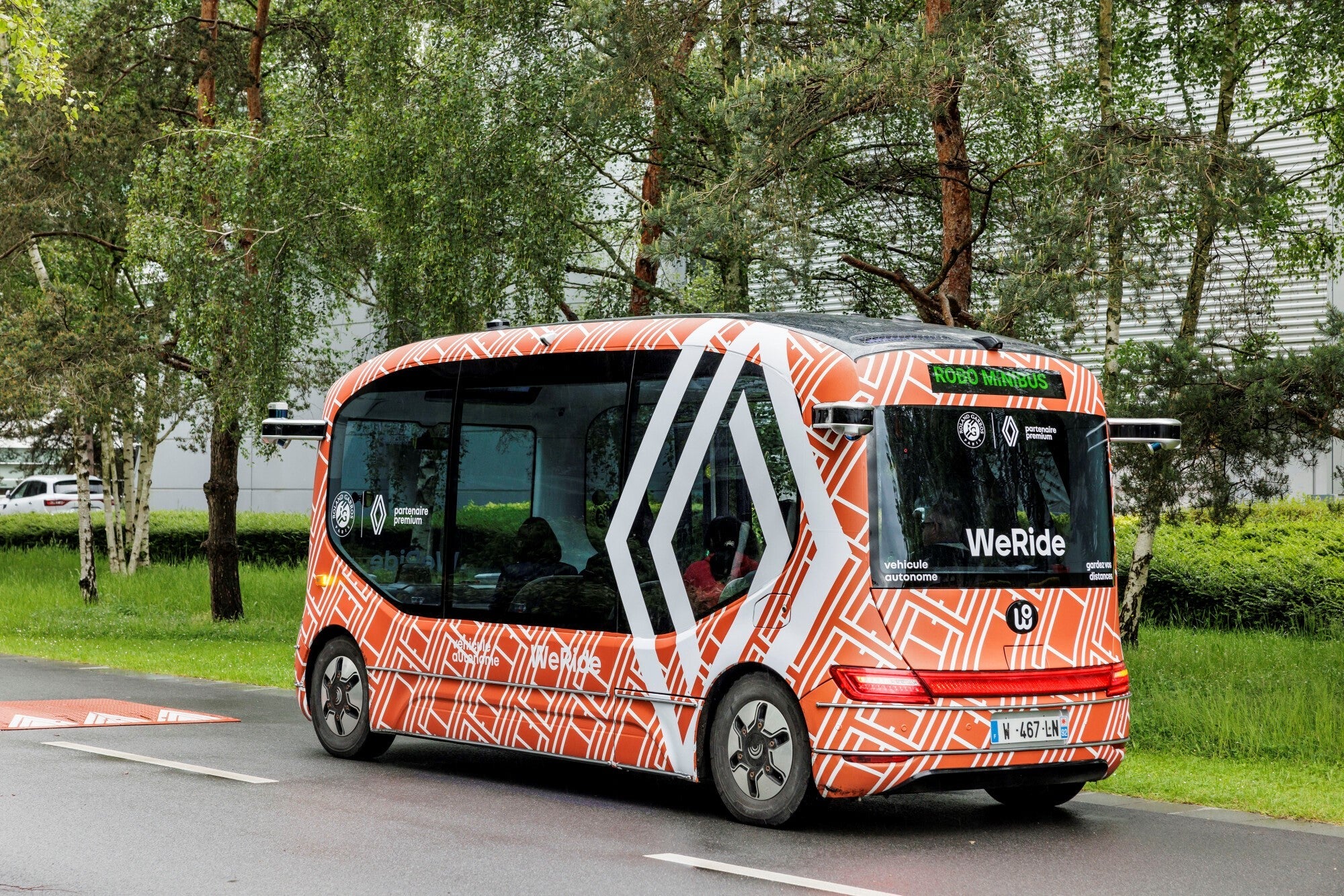
Renault Group is working with with WeRide, an autonomous driving tech specialist, on an autonomous bus that is scheduled for a first demonstration in real conditions from May 26th at the Roland-Garros 2024 tennis tournament.
Renault also says it is working with WeRide for ‘large-scale commercial deployment of vehicles with an L4 level of autonomy’.
As part of the announcement, Renault also provided a useful summary of its strategic thinking on future ADAS (advanced driver assistance systems) and autonomous vehicle (AV) tech offerings and applications.
Renault Group said the Level 4 AV is an ‘offer for public transportation’ and that more flexible, autonomous miniBuses will be able to operate 24/7 in complete safety and will be a zero-emission alternative or an efficient complement to existing solutions (train, tram, bus) in terms of costs and CO2/km per passenger. It also said the additional costs of robotisation and automation could be offset by the absence of on-board operators. Moreover, a ‘simple remote supervision system will be required to operate a fleet of vehicles’.
In its driver assistance/autonomous strategy, Renault drew a distinction between individual/personal vehicle and public transportation applications.
For the individual vehicle, Renault said the plan is to provide assistance rather than autonomy, with ADAS (advanced driver assistance systems) at the top level of the market for even greater safety and comfort.
How well do you really know your competitors?
Access the most comprehensive Company Profiles on the market, powered by GlobalData. Save hours of research. Gain competitive edge.

Thank you!
Your download email will arrive shortly
Not ready to buy yet? Download a free sample
We are confident about the unique quality of our Company Profiles. However, we want you to make the most beneficial decision for your business, so we offer a free sample that you can download by submitting the below form
By GlobalDataHowever, for public transportation, Renault maintains that ‘autonomy is relevant and necessary in order to meet effectively the growing need for low-carbon mobility in the regions’.
Gilles Le Borgne, CTO Renault Group, said: “Renault Group is moving forward to implement its autonomous vehicle strategy. As a result, thanks to our experiments and our partners, the best in their fields, we will be in a position, well before the end of this decade, to propose a highly relevant range of autonomous, low-carbon miniBuses to meet the growing needs of the regions.”
Renault also said the trials will lead Renault Group to offer a robotised electric miniBus platform based on the New Renault Master, able to integrate automation solutions from specialist partners such as EasyMile, Milla and WeRide.
Roland-Garros 2024 tennis tournament trials mean that from 11am to 7pm, from 26 May to 9 June 2024, the experimental service will take passengers from the P2 car park (located on the outskirts of the Bois-de-Boulogne) to the Roland-Garros stadium. And, at the end of the matches, to leave Roland-Garros to the Place de la Porte d’Auteuil or back to the P2 car park.
Alliance Ventures, a strategic fund managed by the Renault-Nissan-Mitsubishi Alliance, first invested in WeRide in 2018.
Renault Group’s autonomous vehicle (AV) strategy – cautious on L3 for human driven vehicles
As part of the trial announcement, Renault also provided more detail on its AV strategy. It said there is an international consensus around six levels on “automated and autonomous driving”, ranging from level L0 without any driving assistance, to level L5, the ultimate level in which the vehicle would be fully autonomous, in all situations and without any on-board operator.
In the case of individual vehicles, Renault Group is concentrating its efforts on the L2 or ‘even L2+ level’, with several driving assistances that are at the ‘top level of the market and make its vehicles safe and pleasant to drive with confidence’. This includes features such as contextual cruise control or lane keeping assist, ‘or soon the automatic overtaking function’. Although assisted, the driver remains responsible for driving.
Renault noted that there is a ‘significant technological complexity gap’ between level L2 automation and level L3 autonomy, because in L3 the vehicle must be able to operate safely in complex environments with limited driver supervision. At this stage, the induced cost to be borne by customers, in relation to the driving benefits, would make demand insufficient or even anecdotal, the company says.
At the same time, the Renault Group is making sure that the architecture of its vehicles can evolve towards the autonomous car ‘if expectations, regulations, or the cost of technologies make this breakthrough feasible’.
On the other hand, when it comes to public transportation, Renault Group sees the relevance of offering autonomous vehicles, with an annual need estimated at ‘several thousand miniBuses over the next few years’.







